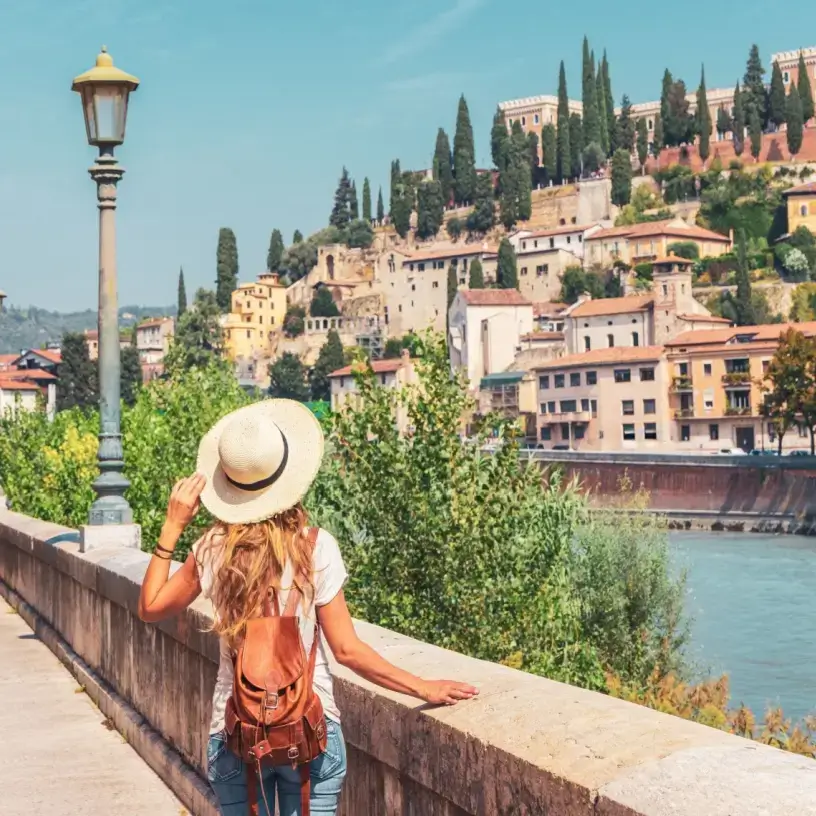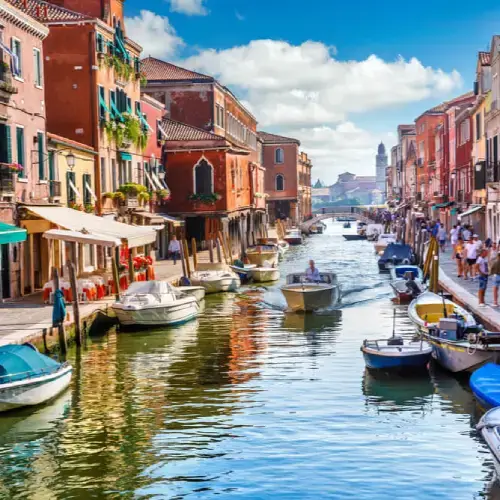Home / Compare Travel Insurance / Travel insurance for Ita…

Key takeaways
- Whether you’re travelling to Florence, Venice, the Amalfi coast, or anywhere else in Italy, it’s important to be covered by a travel insurance policy.
- The inclusions of your policy will vary depending on which insurer you chose, what level of cover you need and if you choose to add optional extras.
- Australia has a Reciprocal Health Care Agreement with Italy that may cover some emergency medical costs, but a comprehensive policy will include cover for issues such as medical evacuation or repatriation, plus many other unfortunate situations.
Expert tips for choosing the right travel insurance for Italy
Our Executive General Manger of General Insurance, Adrian Taylor, has some tips for helping you choose a travel insurance policy for Italy that suits the needs of your trip.

Compare your itinerary to your policy
A comprehensive policy may cover medical expenses, cancellations fees, luggage and more, but if you’re planning on taking a cruise, going skiing and attempting other adventure activities, you may need to purchase additional cover as an optional extra.
Lower your premium by increasing your excess
When you make a claim, you’ll need to pay a policy excess to your insurer. By choosing a higher policy excess, you can reduce the cost of your premium. However, you pay your excess each time you claim, so always choose an amount that’s manageable for your budget.
Declare any pre-existing medical conditions
Always declare any pre-existing medical conditions as part of your travel insurance application to help ensure you have the cover that matches your needs. Taking out a policy that covers your pre-existing medical conditions may cost more but can help prevent any unpleasant surprises if you become ill while travelling and need to claim.
Do I need travel insurance for Italy?
Whether you feel you need travel insurance depends on your individual circumstances, needs and budget. However, travel insurance can help provide a safety net by offering 24/7 emergency assistance. You may also be reimbursed for your expenses if you have delayed flights, trip cancellations or medical emergencies during your trip. Any of these scenarios could potentially cost thousands of dollars, which may come out of your own pocket if you don’t have travel insurance.
Travel insurance companies provide varying policies and levels of cover, so it’s important to read the Product Disclosure Statement (PDS). You should also read the Target Market Determination (TMD) to check whether a policy matches your individual circumstances.
What should be included in travel insurance for Italy?
When travelling anywhere around the world, it’s a good idea to have travel insurance to cover you and your trip. The level of cover you have these situations will depend on the insurance policy you take out, so if you plan to take on any risky adventures or have pre-existing medical conditions, make sure to check the exclusions, restrictions and sub-limits of your policy before purchasing. Here are some inclusions your comprehensive travel insurance policy may include:
Medical care

Australia and Italy share a Reciprocal Health Care Agreement (RHCA), which allows you to seek public medical treatment while in Italy. However, the RCHA only covers certain treatments, so if you require medical evacuation or prescription medication, your travel insurance can come in handy.
A travel insurance plan may cover things like medical evacuations, repatriation back to Australian soil, medications, hospital treatment and other out-of-pocket private hospital expenses.
If you have any pre-existing medical conditions, you may need to disclose your medical conditions to your insurer before purchasing a policy, this way your insurer can assess what cover they can offer for your conditions so you aren’t caught out by unexpected medical bills.
Travel delays and cancellations
You can’t control everything that happens on your trip.
For example, if your flight from Milan to Rome gets delayed by weather conditions and you miss your walking tour, you could incur a cancellation fee. Travel insurance cover may alleviate these kinds of cancellations costs, depending on the type of policy you have, and give you peace of mind knowing you can lodge a claim for this type of event.
Rental excess cover
To drive in Italy, you’ll first need an international driver’s permit (IDP). If you have an IDP and decide to hire a rental car, a comprehensive policy may cover the rental vehicle excess you would pay to the rental company if your car is damaged or stolen.
Loss or theft of luggage
When touring Italy (particularly any famous tourist attractions such as the Colosseum or the Leaning Tower of Pisa), keep your valuables close. Here are just a few ways you can be ‘relieved’ of your belongings in Italy:
- Credit card skimming
- Pickpocketing
- Bag snatching
- Fake tickets for attractions.
Travel insurance could help cover the cost of stolen items and lost luggage expenses, although exclusions apply if your belongings are left unattended or if you don’t take steps to protect them.
Volcanic ash cloud cover
Italy is known for its volcanoes, and there are multiple active volcanoes, including:
- Mount Vesuvius near Naples
- Mount Etna in Sicily
- Mount Stromboli on an island off the north coast of Sicily.
Erupting volcanoes and ash clouds can cause flight cancellations and other booking problems for travellers. Luckily for those with volcanic ash cloud cover, it’s possible to avoid expensive disruptions and receive a reimbursement for your holiday.
This may also be included under cover for natural disasters. If you purchase travel insurance before the natural disaster becomes a known event, your insurer could cover your expenses.
Adventure activities
Before jetting off on an Italian getaway, it’s important to get a policy that covers the activities on your itinerary.
Popular holiday activities in Italy like bicycle touring, trekking and diving on the Amalfi Coast may require adding adventure cover as an add-on to your policy to be covered for any injuries or losses related to your activity.
If you’re planning to hit the slopes, you may need to take out ski cover. Also, be sure medical cover is included when you buy travel insurance if you plan on undertaking potentially risky adventures.
What does travel insurance for Italy not cover?
With every policy, there will be a number of exclusions, limits and sub-limits that come with your policy. Generally speaking, travel insurance won’t cover you if:
- You’ve acted carelessly or unlawfully and it resulted in a loss
- You left your luggage unattended and it was stolen
- The claim is based on a pre-existing condition that is not covered by your policy
- Your injury happened while you were under the influence of drugs or alcohol
- You weren’t wearing a helmet while on a scooter or motorcycle.
To make sure you have cover when you visit Italy, be sure to read the PDS before purchasing your cover so you’re aware of what your policy covers and what it doesn’t.
Do I need a visa for Italy?
Italy lies in the Schengen Area (a collection of 27 European countries with similar border rules). For Australians, this means you can typically travel throughout these countries as a tourist for 90 days without needing a Schengen visa.1 If you’re travelling to more than one country, check out our destination hub for more information on different destinations.
That said, you should always check government websites like Smartraveller to ensure there aren’t any additional conditions for your entry into the country. You typically won’t need a visa if you’re just visiting Italy for a relaxing break. However, if you’re there for a working holiday, you’ll need a Working Holiday Visa.
Meet our travel insurance expert, Adrian Taylor
As a General Insurance expert with over 13 years’ experience in financial services, Adrian Taylor believes in educating customers about the importance of travel insurance so that anyone can kick back and make the most of their time away from home. While no one wants a disrupted holiday, a suitable travel insurance policy can provide a financial safety net for yourself, your belongings and your trip in case things go wrong.
Want to know more about travel insurance?
1 Department of Foreign Affairs and Trade, Australian Government. Smartraveller. Visas and entry requirements in Europe and the Schengen Area. Last updated April 2024. Accessed May 2024.


